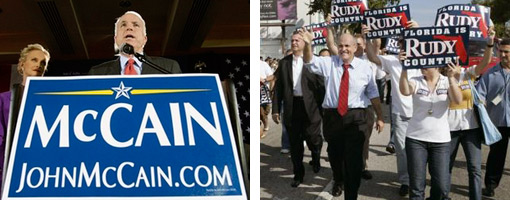
John McCain’s victory in South Carolina is a testament to his resilience and ability to appeal to Republican voters of all kinds. But don’t call him the frontrunner. Rudy Giuliani, until recently the long-time leader in national polling, enters the race on January 29 in the Florida primary, and nothing can be judged until he competes.
McCain took the stage last night to deliver his victory speech at The Citadel and said, “What’s eight years among friends?” It was an awfully forgiving line. Eight years ago, South Carolina (particularly the George W. Bush operatives there) tore John McCain apart, with allegations that his adopted Bengali daughter was actually an illegitimate black lovechild and that he had abandoned his fellow POWs in Vietnam. Those charges and others cost McCain the state and derailed his presidential chances. This time around, McCain ran into some of the same dirty tricks (a flier once again claimed that he had betrayed his fellow POWs), but his main competition, Mike Huckabee, never attacked McCain directly and McCain used a rapid-response team that immediately shot down any wild claims. (Huckabee actually stated in his concession speech that he would rather take second honorably than win using negative attacks, furthering speculation that he would love to be John McCain’s VP.)
The result was that McCain could actually get out his message, instead of playing defense. He focused on patriotism and foreign policy issues, as he always does, but expanded his message to focus on economic issues like cutting taxes and reducing spending. It helped: McCain ended up winning a fairly broad base of voters. Of the 80 percent of voters who identified as Republicans, McCain beat Huckabee by one point. Of the 20 percent who identified as independents, McCain beat Huckabee by 14. Huckabee, a former Baptist pastor, won big amongst voters who attend church multiple times a week, but McCain beat him amongst voters who attend once a week, a few times a month, and rarely. McCain actually claimed 27 percent of those legendary evangelical voters who were assumed to be Huckabee’s base. Voters who considered the economy the most important issue split evenly for McCain and Huckabee, voters who prioritized the immigration issue went slightly for Huckabee, and voters who valued terrorism and the Iraq War went hugely for McCain.
But it’s not time for McCain Fever yet. Pundits love to point out that the winner of the South Carolina primary has always won the Republican nomination. But the primary has only been held since 1980, and was not held in 1984 or 2004 because Republican incumbents were uncontested. That leaves a sample size of just five elections (’80, ’88, ’92, ’96, and ’00), and in each of them the candidate who won did so by a huge margin. In this race, McCain won by just three percent. Never has the Republican race been so wide open; never has a candidate won the all-important Palmetto State by so little.
And besides, Rudy Giuliani throws all assumptions out the window. He eschewed campaigning in South Carolina and in Nevada prior to yesterday’s contests (following a pattern started in Iowa), choosing instead to criss-cross Florida while he had the terrain to himself. On TV yesterday, he told the other candidates to “come on down.” He holds a lead in Florida, but it is dwindling. Romney, Huckabee, and McCain have been gotten weeks of press because of their participation in (and victories in) earlier primaries, and polling shows all three of them gaining on Giuliani. Currently, they are all bunched in second, a few points behind the former New York mayor. McCain’s bounce from South Carolina may or may not put him above Giuliani in Florida polling for the first time.
But the point is that no one has a good feel for the Republican race until the current contenders meet Giuliani in Florida’s battle royale.
And one final reason not to get too excited about McCain or any part of the Republican Party—votes are down. Way down. McCain won South Carolina yesterday with 143,000 votes. He took second in South Carolina in 2000 with 235,000 votes. And that’s not an effect he can attribute to the fact that there were more viable candidates in the race this time around. There were 430,000 total votes in the primary this year; there were 565,000 in 2000. Regardless of who the frontrunner is and who has new-found momentum, Republican voters are simply not energized about their president, their party, or their slate of choices.















